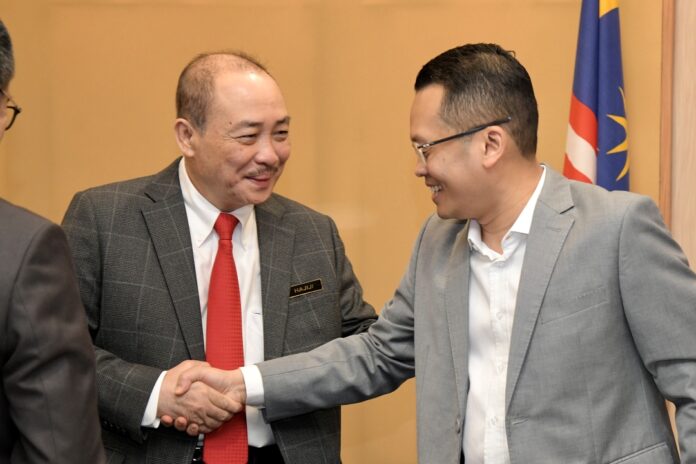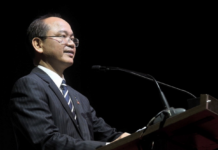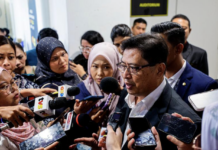KOTA KINABALU, June 12 — A special State Assembly sitting has been slated for Jan 3 next year to pave the way for Sabah to take over regulatory power of the state’s electricity supply, said the Chief Minister Datuk Seri Hajiji Noor.
Hajiji said Prime Minister Datuk Seri Anwar Ibrahim had, in principle, given the green light for Sabah to take over regulatory control of its electricity supply on Jan 1, 2024; thus to meet the timeline, coordination and cooperation from all are crucial so that all issues, particularly the legal process, can be resolved.
The Chief Minister said among the steps required were approval from the Federal Cabinet to invoke and gazette Article 95C of the Federal Constitution to suspend the Electricity Supply Act 1990 (Act 448), Renewable Energy Act 2011 (Act 725) and Sustainable Energy Development Authority Act 2011 (Act 726) in Sabah.
“Subsequently, consent from His Majesty Yang di-Pertuan Agong is needed and to be followed by the Lay Order in Parliament that can be tabled after the suspension,” he said in a statement today.
The statement was issued after the steering committee meeting on handing over of electricity supply regulatory power to Sabah, which Hajiji co-chaired with the Natural Resources, Environment and Climate Change Minister Nik Nazmi Nik Ahmad at Menara Kinabalu here today.
On the Sabah government’s part, Hajiji said two bills on the Electricity Supply Enactment and Renewable Energy Enactment, as well as an amendment to the Sabah Energy Commission Enactment 2023 (to include the regulatory function on electricity supply and renewable energy), will be tabled during the special State Assembly sitting.
“We need concurrence from ministries and relevant agencies both at the Federal and state level so that all these processes can be done smoothly, especially in terms of legality and to avoid interruption to the electric supply operations in Sabah,” he said.
Later, Hajiji and Nik Nazmi co-chaired the Sabah Planning and Implementation of Electricity Supply and Tariff Committee (JPPPET) meeting, where the Sabah Generation Development Plan (2023-2027) was endorsed aimed at providing an immediate solution to Sabah’s current critical shortage of power generation.
Hajiji said that in anticipation of the handing over of the regulatory control of electricity supply to Sabah, the Federal government was urged to facilitate and continue the processes to ensure on-time completion of the projects planned under the Sabah Generation Development Plan.
He said this included fast-track measures to increase power at the East Coast, which will quickly restore Sabah’s electricity reserve margin to at least 30 per cent by September this year.
“This will provide an immediate solution to the acute capacity shortage in Sabah, thus demonstrating the state and federal government’s commitment to resolving the issue comprehensively and effectively,” Hajiji said.
Besides, the meeting also decided to add generation capacity on the west coast utilising existing natural gas supply as well as other additional generation projects throughout Sabah.
He said the state government realise the importance of boosting usage of renewable energy to support the national neutral carbon initiative and the high potential of solar energy in Sabah, therefore the state government will increase the Large-Scale Solar power production to 100MW in 2026 on the East Coast.
Hajiji added that given the hydroelectric potential to enhance renewable energy capacity, the state government, through ECoS, will conduct a study to formulate a Sabah Hydroelectric Development Masterplan beginning this year.
He also reiterated the Sabah government’s stand on the Southern Link 275kV Transmission Line project from Sipitang to Tawau, which he had raised at the last JPPPET meeting, which will boost the grid resilience and complete the 275kV loop system enabling higher electricity capacity distribution to major industrial users.
Hajiji said the Southern Link project must be implemented and the Federal government must allocate funding via grant because it is a public amenity project that must be completed by 2028 in order for power from two new hydroelectric stations to be channelled to consumers through the state grid.
The Chief Minister said that in addition, a Sabah Energy Roadmap and Masterplan 2040 (SE-RAMP 2040) prepared by ECoS, covering various strategies and initiatives to balance power needs and ensure energy security, affordability and environmental sustainability, will be launched soon.
















